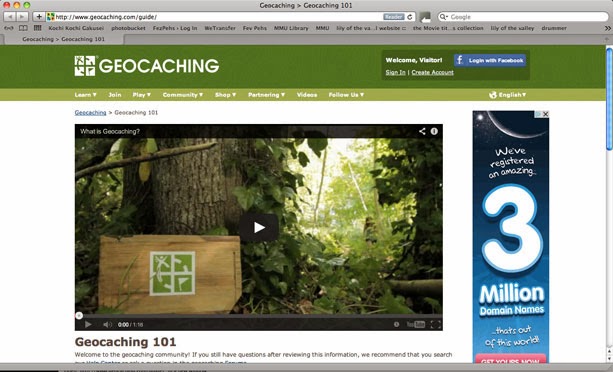Talk by Paul Zak: Trust, morality - and oxytocin?
This is an amazing project I found out about today. All over the country there are plastic boxes etc hidden with "treasures" in them. You download the app and it tells you where this one in your area. You head out to find it with some things you'd like to leave in the box. Once you have found the box you open it, write your name in the log book and then swap things in the box for the bits that you have brought with you! Ha what a brill idea! We could perhaps give it a try and document it. It works well for the Oxytocin and story telling but perhaps we could create one that is easy to get to for anyone with a disability to relate it back to the Inclusive Design! http://www.geocaching.com/guide/
Thought about this when we were talking about letters. This project aims to send everyone in the world a letter, and receiving handwritten letters always makes people smile! :- ) They pick a town and send everyone in it a letter on the same day which sparks everyone there to talk about the mysterious letter they received that day in the post! The Mysterious Letter Project.
Keep meaning to post about the cat cafes in Tokyo too! A triple release of oxytocin, warm drinks, socialising and cat interaction! ha ha! If you like cats of course otherwise it could have the opposite effect!
Stefan Sagmeister - This guy is just fantastic! One of his recent projects is The Happy Show/Film. Thought it would be a good reference for what can release Oxytocins!
. . . . . . . . . . . . . . . . . . . . . . . . . . . . . . . . . . . . . . . . . . . . . .
MY INCLUSIVE DESIGN RESEARCH
Exclusion calculator!
"For Our Times: 50 Pirate Works consists of fifty copies of Charles Dickens' Hard Times. Presented as externally identical paperback books, each text has been reworked in some way to illustrate issues of appropriation, piracy, authority and algorithmic intervention in the digital age."
Designing with people - their stories regarding how inclusive design can help them.
. . . . . . . . . . . . . . . . . . . . . . . . . . . . . . . . . . . . . . . . . . . . . .
MY STORYTELLING RESEARCH
This is an interesting point by Roland Barthes..."To give a text an Author" and assign a single, corresponding interpretation to it "is to impose a limit on that text." The Death of the Author, essay written in 1968.
"text is a tissue [or fabric] of quotations," drawn from "innumerable centers of culture," rather than from one, individual experience. The essential meaning of a work depends on the impressions of the reader, rather than the "passions" or "tastes" of the writer; "a text's unity lies not in its origins," or its creator, "but in its destination," or its audience.
Automatic writing or psychography is writing which occurs either by the writers subconscious or by external spirits operating through the writer. In spiritualism, spirits are claimed to take control of the hand of a medium to write messages, letters, and even entire books.
Storytelling in advertising and marketing is a really big thing now as it makes brands appear more human to their customers and gains loyalty. e.g. Sainsbury's According to Giles Lury, this marketing trend echoes the deeply rooted need of all humans to be entertained. Stories are illustrative, easily memorable, and allow any firm to create stronger emotional bonds with the customers. Developments include the use of trans-media techniques, originating in the film industry which Build a world in which your story can evolve. Examples include Coca-Cola's "Happiness Factory"
Artist Grayson Perry did a brilliant documentary last year called 'In The Best Possible Taste' where he analysed the ideas of taste held by the different "social classes" of the UK. It's a really good programme if you've not seen it you can probably find it online somewhere, highly recommended! He visited different families/people and they spoke about their lives and tastes about things they like/dislike. From his findings he made 6 absolutely beautiful tapestries, 2 for each of the classes he looked at.
I saw this guy, James Bridle talk in Liverpool earlier this year and one of his projects came to mind when researching for storytelling. He created a twelve volume set of all changes to the wikipedia article on the Iraq War. The 12 volumes cover a five year period from Dec 2004 - Nov 2009 with a total of 12,000 changes and almost 7,000 pages. Project - 'The Iraq War Wikihistory'
This is a really lovely example of contemporary "story telling", again by James bridle showing how technology changes the way we read or write about things. The project is called 'For our times'
Another interesting project on storytelling by Ken Perlin where he maps out Pride and Prejudice how technology can be introduced to traditional storytelling.

















No comments:
Post a Comment